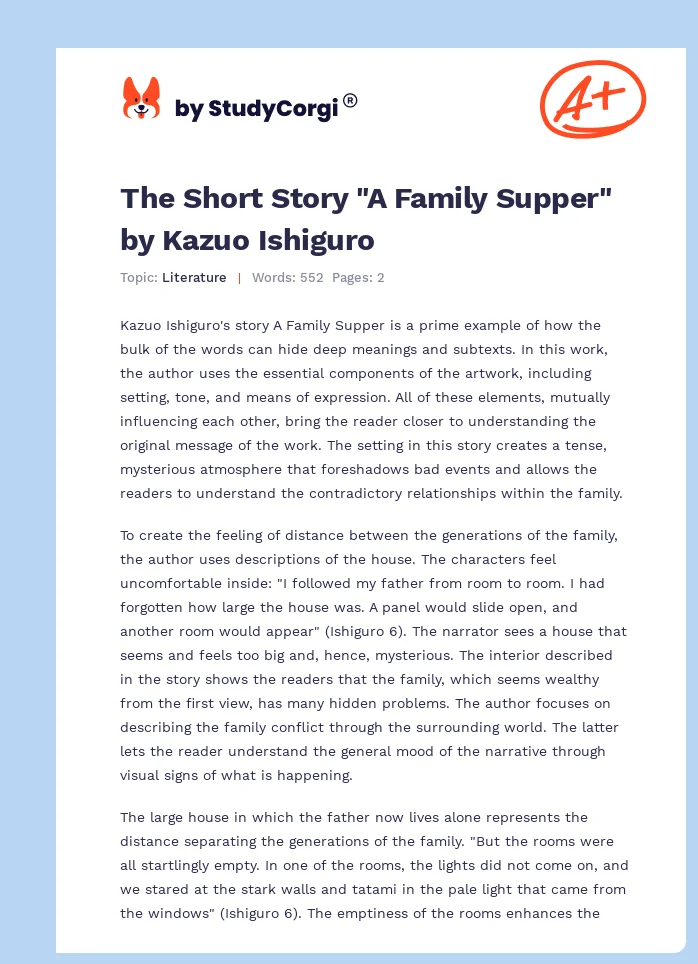Kazuo Ishiguro's Novels: A Study Of Memory, Forgetting, And The Power Of Imagination

Table of Contents
The Fragility of Memory in Ishiguro's Fiction
Ishiguro masterfully portrays the unreliable and often fragmented nature of memory, highlighting its subjective and reconstructive qualities. This fragility significantly impacts his characters' understanding of themselves and the world around them.
The Remains of the Day and the Burden of the Past
In The Remains of the Day, Stevens, a butler reflecting on his life, presents an unreliable narration heavily influenced by repressed memories. His carefully constructed narrative reveals a man burdened by the weight of duty and the selective nature of his recollections.
- Duty and Regret: Stevens' unwavering dedication to his employer obscures his own desires and emotions, leading to profound regret and a distorted perception of the past.
- Selective Memory: He selectively remembers aspects of his service that uphold his self-image, omitting or downplaying events that contradict his carefully cultivated persona.
- Impact of Forgetting: His repression of painful emotions and crucial historical events hinders his self-understanding and prevents genuine connection with others. Forgetting, in this context, is not simply a lapse in recollection, but an active mechanism of self-preservation.
Never Let Me Go and the Constructed Memory
Never Let Me Go presents a starkly different perspective on memory through Kathy, Ruth, and Tommy, clones raised for organ donation. Their manufactured identities directly impact their fragmented and incomplete memories of childhood.
- Constructed Identities: Their understanding of themselves is fundamentally shaped by their predetermined fate, resulting in a unique perspective on memory and its limitations.
- Ethical Implications: The ethical implications of genetic engineering and its impact on identity are deeply explored; their limited memories contribute to their stunted emotional development and limited understanding of their own mortality.
- Imagined Futures: Despite their predetermined fate, the characters cling to imagined futures and the power of love and connection, highlighting the human capacity for hope even in the face of bleak realities.
When We Were Orphans and the Unreliable Narrator
Christopher Banks, the protagonist of When We Were Orphans, embarks on a quest to find his long-lost parents, driven by fragmented and possibly unreliable memories of his childhood.
- Trauma and Identity: His unreliable narration reflects the impact of childhood trauma and his desperate search for self-discovery.
- Distorted Lens: The reconstruction of his past is interwoven with his present anxieties, blurring the lines between fact and fiction.
- Quest for Self-Discovery: His journey highlights the fallibility of memory and the challenges of piecing together a coherent self-narrative when dealing with significant gaps in recollection.
The Power of Imagination as a Coping Mechanism
In the face of adversity, Ishiguro's characters utilize imagination as a powerful coping mechanism, creating alternate realities and finding solace in fantasy.
Escapism and Fantasy in Ishiguro's Worlds
Imagination serves as a form of escapism for many of Ishiguro's characters, allowing them to cope with harsh realities and traumatic pasts.
- Comfort and Meaning: In Never Let Me Go, the characters find solace in their shared memories and imagined futures, fostering a sense of community and hope.
- Storytelling as Refuge: In The Remains of the Day, Stevens' meticulous recall of events, while selective, provides a sense of order and control in a life marked by loss and regret.
The Creation of Alternative Realities
Ishiguro explores how characters construct alternate realities through memory and imagination to make sense of their experiences and reconcile with the past.
- Blurring Lines: In The Buried Giant, the blurring lines between reality and imagination are central to the narrative, exploring the complexities of memory and its influence on perception.
- Reconciliation: In Klara and the Sun, Klara's simple yet profound observations challenge the characters' understanding of the world, prompting a reflection on the importance of connection and the limitations of human understanding.
Forgetting as a Means of Survival and Self-Preservation
Forgetting, in Ishiguro's novels, is not simply a passive process; it's an active strategy used by characters to cope with emotional pain and trauma.
Repressed Memories and Psychological Defense Mechanisms
Characters often employ repression and forgetting as psychological defense mechanisms to manage emotionally overwhelming experiences.
- Psychological Impact of Trauma: In The Remains of the Day, Stevens' repressed emotions manifest as emotional detachment and an inability to form genuine connections.
- Maintaining Normalcy: In When We Were Orphans, Christopher's fragmented memories reflect his efforts to protect himself from the pain of his past, even at the cost of self-understanding.
The Ethics of Forgetting and Collective Memory
Ishiguro also explores the broader ethical implications of forgetting, particularly concerning historical events and their impact on future generations.
- Collective Memory and National Identity: The Remains of the Day implicitly addresses the collective forgetting surrounding Britain's role in World War II, highlighting the complexities of national identity and collective memory.
Conclusion
Kazuo Ishiguro's novels offer profound explorations of memory, forgetting, and the power of imagination. These themes are not merely stylistic choices but fundamental elements that shape his characters' identities, drive their actions, and ultimately determine their fates. His masterful use of unreliable narrators, fragmented recollections, and constructed realities challenges readers to confront the subjective nature of memory and its enduring impact on the human experience. Through a careful examination of these themes across his varied works, from the restrained elegance of The Remains of the Day to the unsettling dystopia of Never Let Me Go, Ishiguro provides an enduring commentary on the human condition. Continue exploring the multifaceted worlds of Kazuo Ishiguro's novels and share your interpretations of memory, forgetting, and imagination in his works. Which novel resonated with you the most? Let us know in the comments below!

Featured Posts
-
 Moto Gp Inggris Marquez Raih Waktu Tercepat Di Fp 1 Kejadian Motor Mogok Mwarnai Sesi
May 26, 2025
Moto Gp Inggris Marquez Raih Waktu Tercepat Di Fp 1 Kejadian Motor Mogok Mwarnai Sesi
May 26, 2025 -
 Relay Sweep Earns T Bird Girls Home Invite Tournament Win
May 26, 2025
Relay Sweep Earns T Bird Girls Home Invite Tournament Win
May 26, 2025 -
 Craig Mc Ilquham Hells Angels Member Laid To Rest Sunday
May 26, 2025
Craig Mc Ilquham Hells Angels Member Laid To Rest Sunday
May 26, 2025 -
 Prokuratorzy Unikaja Pytan W Polsce24 Szokujacy Blamaz
May 26, 2025
Prokuratorzy Unikaja Pytan W Polsce24 Szokujacy Blamaz
May 26, 2025 -
 Bourse Payot 2024 Victoire De Hugo De Waha
May 26, 2025
Bourse Payot 2024 Victoire De Hugo De Waha
May 26, 2025
